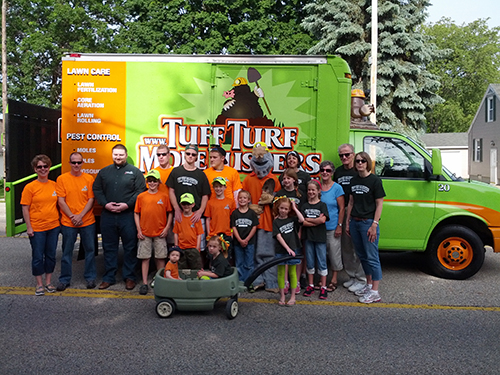
Michigan company makes a name for itself with unique ideas and high-quality service.
Jim Zylstra recalls his foremen being less than enthusiastic about driving the company’s new fleet of vehicles.
After all, each bright green and orange car, truck and van has a giant, helmet-wearing mole mounted to its top. But even the most skeptical crew member had to acknowledge his boss was on to something when a potential customer approached him about the company’s services during his first morning in the new truck. To this day the company, Tuff Turf Molebusters, gains hundreds of new clients each year simply by having its 15 vehicles on the road.
“My No. 1 source for business is referrals—No. 2 is people who see our trucks,” says Zylstra, who redesigned his vehicles in 2009. “Before, we had white trucks with green letters and grass painted along the bottom, like everyone else. It took not even getting to the first job for our new trucks to work.”
A former accountant who longed to spend his days outside, Zylstra started Tuff Turf Molebusters in 1994 “the same way everyone else does—by knocking on doors.” But Zylstra has since made his living being a little bit different. The $1.85 million company in Byron Center, Mich., offers turf and ornamental services (60 percent) and pest control (40 percent) to a 90 percent residential, 6 percent commercial and 4 percent municipal clientele. Zylstra says his specialties are the time-consuming and other unpleasant services no one else wants to do, such as rolling lawns (more than 300 every spring), core aeration (with one dedicated crew member from mid-May to October) and, of course, mole control.
The company’s 12-step, three-month mole control program uses traps, bait and repellents to eradicate the damaging rodents, and is his fastest-growing service requiring seven dedicated crews.
The “Michigan Mole Tally” keeps track of the company’s progress on its home page. It uses a computer system to track how many moles the company has caught to date: a record-setting 3,916 in 2014 and 18,615 since the tally began in 2005. Zylstra also shares the tally on the company’s Facebook page.
“At first we did it for fun, but then we realized we really do catch a lot of these things to the point where it’s unbelievable,” he says. “Our customers think it’s neat, but on the other hand, it’s become a selling point for us as a company that specializes in this. It proves we are catching them.”
The company’s distinctive characteristics recently helped Zylstra win a new vehicle for his fleet during the Transit Means Business Challenge, sponsored by Ford. To enter, applicants submitted 300 words about how they would use the prize: a new vehicle. In his essay Zylstra said he could create a new job and also “put a bright green and orange vehicle with a giant mole on top on the road for people to gawk at.”
A panel selected the top 10 entries, and then put the vote on social media. Zylstra won a 2015 Ford Transit and was able to customize it to fit his needs. He added a ramp, a fertilization tank and his signature décor, which typically costs $4,000-$5,000 for the paint job. The wooden mole, which comes complete with a helmet that lights up, adds another $1,400-$1,500. Following through on his word, Zylstra hired a new employee, a fertilizer technician, in March.
Some similarities

Despite the ways Tuff Turf Molebusters is different, Zylstra faces many of the same challenges other company owners face.
Finding good help is difficult, and Zylstra tries to alleviate the problem by paying better than the competition and by making his company an overall positive place to work. Managing the company’s 12- to 15 percent annual growth is another challenge requiring constant updates to existing systems and procedures, and implementation of new ones. Zylstra changes job descriptions every six months to keep up with evolving roles and new levels of management.
“I’m not a procedure or rules kind of guy, so it’s more for the staff than it is for me,” he says. “But as my guys find different ways to help the company improve efficiencies, I value their input. It also helps when we hire new people because we can all be on same page.”
Government regulations are another concern for Zylstra. He’s currently spending time and money to comply with pesticide storage regulations because his facility was out of compliance. The state has redefined the definition of “spot treatment” for weeds, resulting in the need for more training for his technicians and more education for his customers. And the health care “hoopla” has “not been fun to navigate,” he says.
But as long as pesky critters continue to ravage lawns, Zylstra is optimistic about the future. He says it’s a sign of an improving economy that more homeowners are able to invest in pest control, which he calls “sort of a luxury service.” Zylstra isn’t sure if there are more moles, mice and other varmints these days or if people simply have less tolerance for the damage they cause. But, he says, when customers are ready to take care of the problem, they know who to turn to.
“The company name they don’t always remember,” Zylstra says. “But they remember the cars.”
Schappacher is a freelance writer based in Charlotte, N.C.

